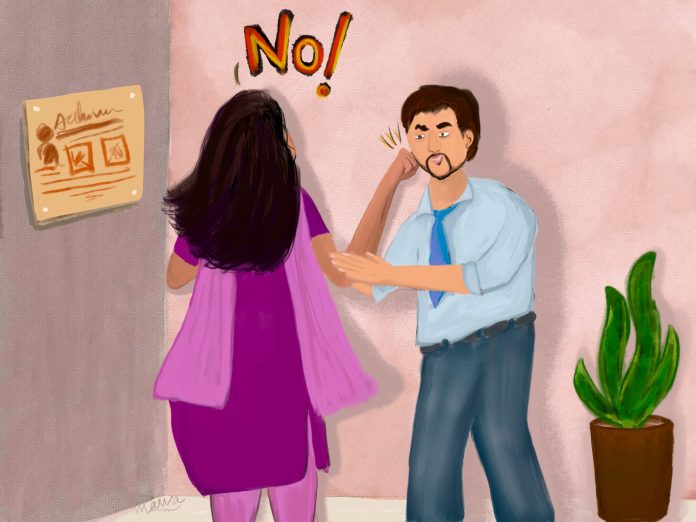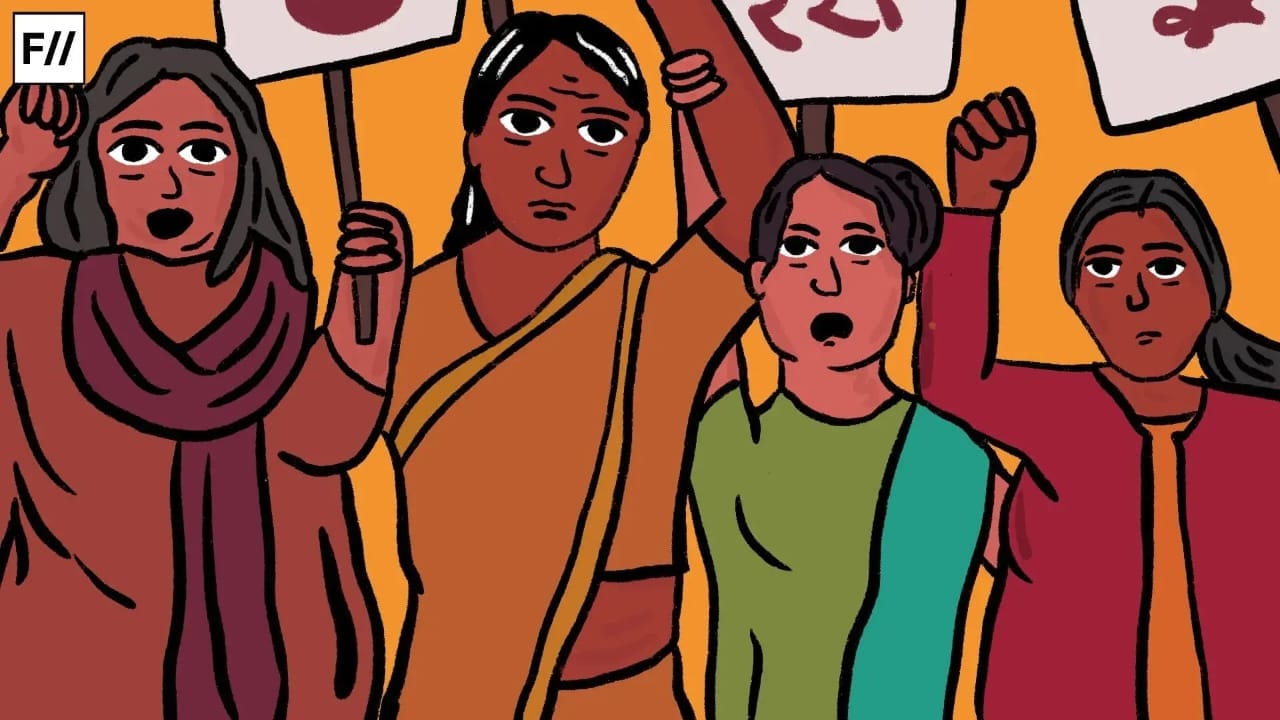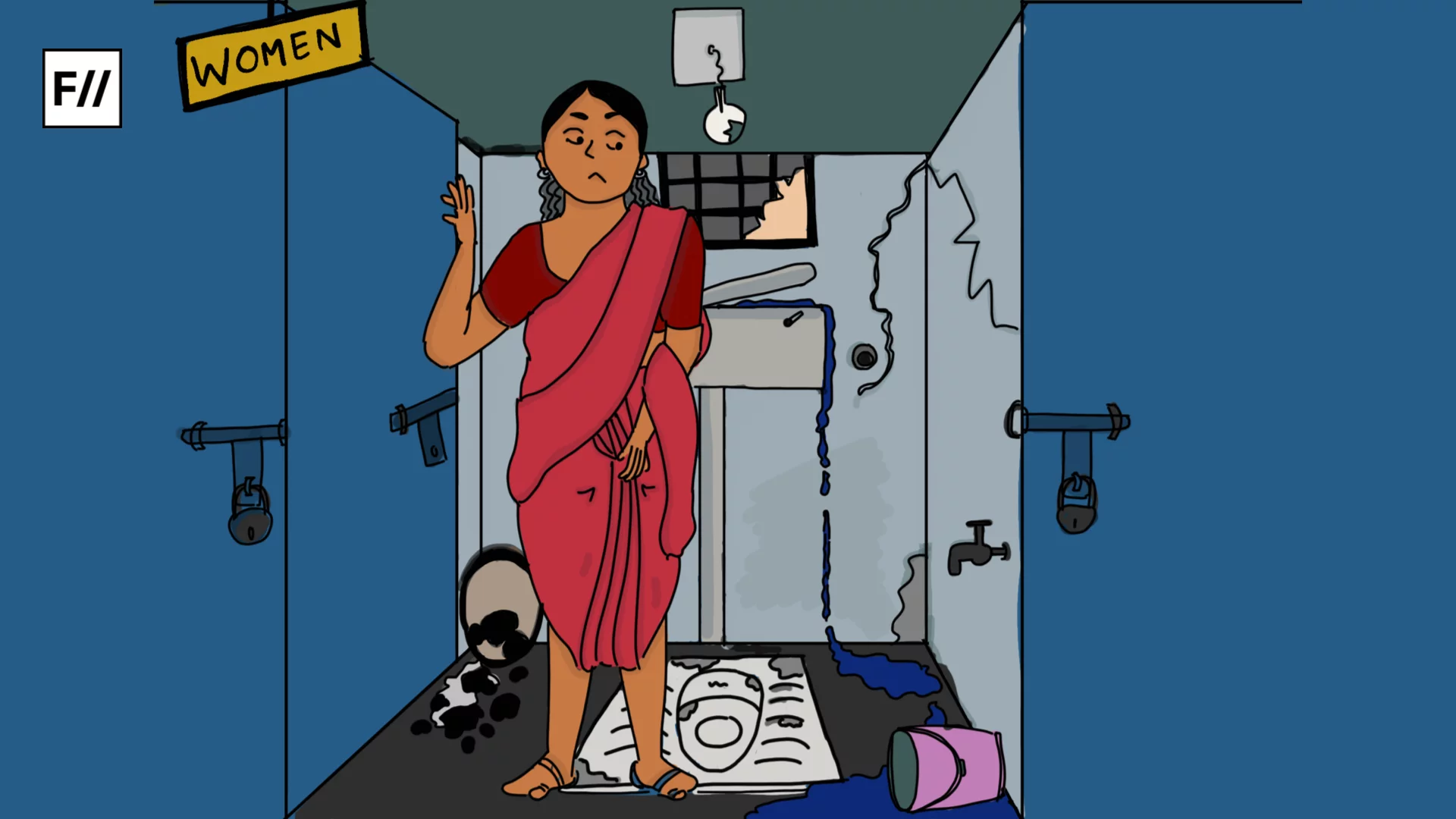Trigger Warning: Sexual Harassment and Assault
Editor’s Note: This month, that is January 2021, FII’s #MoodOfTheMonth is Work and The Workplace, where we invite various articles to highlight the profound changes that our workplaces may or may not have undergone and the effect that these changes have had on our personal and professional lives and ways of living in the time of the pandemic. If you’d like to share your article, email us at pragya@feminisminindia.com.
“I am not free while any woman is unfree, even when her shackles are very different from my own.”
― Audre Lorde
We usually talk about the advancement and empowerment of women, but how often do we ever focus on safer workplaces for them? We tend to forget or disregard the issue of sexual harassment in the workplace. Women’s work participation is around 82.6%. Official data show women’s work participation rate is 25.3% in rural areas and 14.7% in urban areas. Women work in every field of knowledge such, as technology, politics, science, medicine, anthropology, etc. But the issue of sexual harassment at the workplace remains invisible.

It is one of the barriers that come along with women when they pursue their careers. It is a way to limit women’s access to power, space, movement, freedom, and career opportunities. This might have long-term implications on women’s mental health and well-being. Many people argue the sexual harassment in the workplace is a matter of sex discrimination or subordination of women due to gender differences. But my understanding of the feminist agenda against SH in the workplace wants to emphasise that sexual harassment is more about power rather than people’s ‘sex’.
We can’t achieve empowerment without taking action against the patriarchal power-gender-role ideology. Today, sexual harassment at the workplace poses a threat to the development of the nation. Without women’s safety and empowerment, India can never achieve sustainable development goals and gender equality.
Feminist Agenda To Challenge Sexual Harassment In The Workplace
Feminism and its agenda for combating sexual harassment must provide a platform for everyone to interact, initiate, and take immediate actions (IIIAs) against sexual harassment in the workplace. It is possible through consciousness-raising or gender sensitivity programmes. Additionally, various organisations work with a commitment of decreasing the harassment-related outcomes to provide safer spaces for women.
For example, Gender at Work, India is an NGO working for women to make safe working zones. It also organised training programs, workshops under the Sexual Harassment of Women at Workplace Act, 2013. The efforts of PRIA (a global center for participatory research and training) to assist the training programs for various platforms is helping women to fight against the power hierarchy of the workplace. Several NGOs, organisations, and other schemes (One Stop Centres) are helping women to build safer places.
Have You Ever Noticed?
Women’s exploitation and harassment at the workplace reflects men’s authority and the paradox of power. It perpetuates through privilege, gender-based inequality, and discrimination within the systemic power dynamics. Women who challenge this power, authority, and patriarchy might become more prone to sexual harassment at the workplace. Male-power seems like a parasite-power-syndrome where men exploit women in the workplace by taking their self-esteem, dignity, and body and give nothing in return except low wages of income or life term humiliation.
Further, questions arise around the implementation of policies or schemes to eliminate sexual harassment at the workplace. There is a lack of ethical ideology to identify the sexual behaviors of an individual or an employee. The more obvious kinds of sexual harassment include sexual favours, economic (dis)advantage, harassment, verbal abuse, and sexist attitude. But the covert forms of sexual harassment become ignored.
Sexual harassment could also lead to fatal implications on mental and physical health such as trauma, depression, anxiety, eating disorder, high dose of alcohol and drugs, emotional exhaustion, fear, envy, lower satisfaction, self-blame, etc. We can’t achieve empowerment without taking action against the patriarchal power-gender-role ideology. Today, sexual harassment at the workplace poses a threat to the development of the nation. Without women’s safety and empowerment, India can never achieve sustainable development goals and gender equality.
Also read: ‘Period Leave’, Period. Unlearning The Bias Against Menstruation At Workplace
Why Are So Many Women Silent Even Today?
Many women choose to remain silent due to victim-blaming. Their resistance is persecuted with the fear of the tactics by patriarchy. Gender stereotypes and stigma is attached when women speak after years to reveal the harassment they faced at one point in their lives. They are blamed for their enduring silence rather than being appreciated and protected for speaking out. The moral obligations by society decide the future of women. Their movement, freedom, and liberty is curtailed if women reveal that they have been harassed at the workplace.
Gender stereotypes and various stigma are attached when women speak after years to reveal the harassment they faced at one point in their lives. They are blamed for their enduring silence rather than being appreciated and protected for speaking out.
Laws, policies, and schemes alone cannot protect women unless we try to inject the revolution of the unheard voices. The feminist agenda recognises this issue as a structural problem that is far beyond the social problem. It produces a toxic atmosphere and negligence of organisational policies at the workplace. In informal sectors, 93% of women are working and remain unprotected by laws. We can see a large gap between rural and urban working conditions, formal and informal, etc. Sexual Harassment of Women at Workplace (Prevention, Prohibition, and Redressal) Act, 2013 helps women in the organised sector to file complaints against the offender.
But how many are in a position to address the issue of sexual harassment at the workplace? The lack of data and the implementation of local committees are major drawbacks in the implementation of these laws. The laws largely remain on paper. The online complaint box for sexual harassment at work, 2017 received 600 complaint cases in 2 years. According to the report given by economic times, women in the informal sector rarely file a complaint of sexual harassment due to the fear of losing jobs and their family members would stop them from working.
Also read: ‘You Don’t Behave Like A Muslim’: Being Muslim At The Workplace…
Leadership, accountability, feminist consciousness, and women’s representation at higher positions in the workplace can help to build sustainable and safer environments for women. Women are also contributing to the continuity of the legacy of sexual harassment at the workplace. They too learn sexism and gender stereotypes through traditional paradigms that reduce their potentiality and courage to challenge male dominance.
References
- UN Women
- Economic Times
- Sexual Harassment: A Matter of Individual Ethics, Legal Definitions, or Organizational Policy? Author(s): Joann Keyton and Steven C. Rhodes (Jstor)
- Mainstream Neglect of Sexual Harassment as a Social Problem Author(s): Aysan Sev’er (Jstor)
Maria Khanam is pursuing MA Gender Studies at Jamia Millia Islamia and completed graduation in English Honours. Her journey from self-exploration to feminist consciousness is filled with vibrant colors of experiences. She has a keen interest in Islam, Women, and Gender issues, which always creates a curiosity to develop consciousness among the youth of this generation. Her concern is to eliminate patriarchy, sexism, and traditional gender roles. “Break the silences, voiceless to voice, and to be heard” is her motto to bring justice. You can find her on her blog and Instagram.




